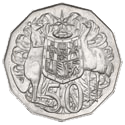Australian fifty-cent coin
| Australia | |
| Value | 0.50 AUD |
|---|---|
| Mass | 15.55 g |
| Diameter | 31.65 mm |
| Thickness | 2.80 mm (maximum) [1] |
| Edge | Plain |
| Shape | Dodecagonal |
| Composition | 75% Copper, 25% Nickel |
| Years of minting | 1969–present |
| Catalog number | — |
| Obverse | |
 | |
| Design | Elizabeth II, Queen of Australia |
| Designer | Ian Rank-Broadley |
| Design date | 1999 |
| Reverse | |
 | |
| Design | Australian coat of arms |
| Designer | Stuart Devlin |
| Design date | 1965 |
The twelve-sided Australian fifty-cent piece is the third-largest denomination coin of the Australian dollar and the largest under a dollar in circulation. It is the only 12-sided coin of its size in the southern hemisphere. It was introduced in 1969 [2] to replace the round fifty-cent coin issued in 1966.
The original, round, 50-cent coin was made of 80% silver and 20% copper; but as the value of a free-floating silver price became higher, the coin's bullion value became more valuable than its face value; so that version was withdrawn from circulation and replaced with the dodecagonal cupro-nickel version.
It is by diameter the largest Australian coin currently issued and second largest after the Crown of 1937–38. It is also the heaviest Australian coin in common circulation. Many commemorative designs have been issued, the large size allowing for detailed content.
With a diameter of 31.5 mm (1.24 in), the 50-cent coin is one of the largest in size among those currently circulating in the world. Coins of larger diameter include the Costa Rican five-hundred-colónes, Ni Vanuatu fifty-vatu and the fifty-CFP Franc are larger, all 32.9 mm.
Obverse
As with all coins of Australia, the reigning monarch features on the obverse. Only Elizabeth II has been monarch during the coin's existence.
Unlike other decimal denominations, four different portraits of Her Majesty have been used on 50c coins. A unique effigy by Vladimir Gottwald was used for the 2000 Royal Visit commemorative fifty-cent piece.[3][4] This is the only Australian decimal coin to have an obverse designed by an Australian[5] and to have a portrait of the queen which is not also used on British currency.
The other three portraits have featured on all then-current denominations: from 1966 to 1984 one by Arnold Machin,[6] from 1985 to 1998 one by Raphael Maklouf,[7] and since 1999 a portrait by Ian Rank-Broadley.[8][9] These portraits were introduced to British coins in 1968, 1985, and 1998 respectively.
Commemorative coins
The Australian fifty-cent coin was the first to display a variation of the reverse design in 1970 for the commemorating the bicentennial of Lieutenant James Cook's landing in Australia. Various other designs followed until the one-dollar and twenty-cent also included new designs.
- 1970: Bicentenary of the exploration of the eastern coast of Australia by James Cook.
- 1977: Silver Jubilee of Queen Elizabeth II.
- 1981: Charles, Prince of Wales and Lady Diana Spencer Royal Wedding.
- 1982: XII Commonwealth Games, Brisbane
- 1988: First Fleet Bicentenary 1788-1988.
- 1991: 25th Anniversary of Decimal Currency.
- 1994: International Year of the Family.
- 1995: 50th Anniversary of the end of World War II.
- 1998: Bicentenary of the discovery of Bass Strait.
- 2000: Millennium Year.
- 2000: Royal Visit.
- 2001: Centenary of Federation of Australia: one coin featuring the coat of arms, and nine coins for the six states plus the Northern Territory, Norfolk Island and the Australian Capital Territory [10]
- 2002: Year of the Outback.
- 2003: Australia's Volunteers
- 2004: Student Design Coin 'Australia'.
- 2005: World War 1939-1945 Remembrance.
- 2005: XVIII Commonwealth Games, Melbourne
- 2010: Australia Day.
- 2013: Prince George of Cambridge.
- 2014: AIATSIS 1964-2014.
Most years have the coat of arms except those below, years of non-issue are: 1986, 1987, 1989, 1990, 1992.
There are two versions of the coat of arms: the older is squeezed into the available space; the newer is laid out unsqueezed.
Standard designs were also issued with commemoratives in the following years: 1981, 2004, 2005 and 2010.
See also
External links
References
- ↑ http://www.comlaw.gov.au/Details/F2005L04157
- ↑ http://worldcoingallery.com/countries/display.php?image=img4/10-68&desc=Australia+km68+50+Cents+(1969-1984)&query=Australia
- ↑ http://www.cruzis-coins.com/50c/2000.html
- ↑ http://www.ramint.gov.au/designs/obverse/gottwald.cfm
- ↑ http://www.ramint.gov.au/designs/obverse/gottwald.cfm
- ↑ http://www.ramint.gov.au/designs/obverse/machin.cfm
- ↑ http://www.ramint.gov.au/designs/obverse/maklouf.cfm
- ↑ http://www.ramint.gov.au/designs/obverse/rb.cfm
- ↑ http://worldcoingallery.com/countries/display.php?image=img14/10-404&desc=Australia+km404+50+Cents+(1999--+)&query=Australia
- ↑ http://worldcoingallery.com/countries/galleries/Australia.html
| Preceded by Australian 50 cent coin (round) |
Fifty Cents (Australian) 1969–present |
Succeeded by Current |
| ||||||||||||||||||||||||||